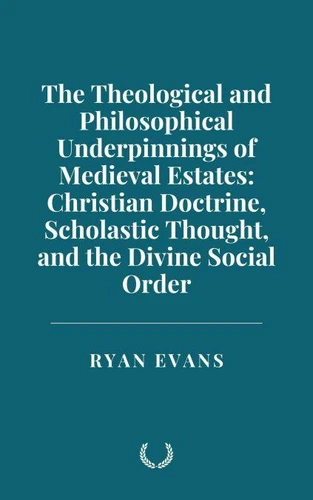The Theological and Philosophical Underpinnings of Medieval Estates: Christian Doctrine, Scholastic Thought, and the Divine Social Order
Par :Formats :
Disponible dans votre compte client Decitre ou Furet du Nord dès validation de votre commande. Le format ePub est :
- Compatible avec une lecture sur My Vivlio (smartphone, tablette, ordinateur)
- Compatible avec une lecture sur liseuses Vivlio
- Pour les liseuses autres que Vivlio, vous devez utiliser le logiciel Adobe Digital Edition. Non compatible avec la lecture sur les liseuses Kindle, Remarkable et Sony
 , qui est-ce ?
, qui est-ce ?Notre partenaire de plateforme de lecture numérique où vous retrouverez l'ensemble de vos ebooks gratuitement
Pour en savoir plus sur nos ebooks, consultez notre aide en ligne ici
- FormatePub
- ISBN8231553402
- EAN9798231553402
- Date de parution25/06/2025
- Protection num.pas de protection
- Infos supplémentairesepub
- ÉditeurWalzone Press
Résumé
This book offers an illuminating journey into the theological and philosophical roots of the medieval Estates system-the tripartite social order of clergy, nobility, and commoners that shaped European society for centuries. Blending rigorous historical analysis with profound explorations of key thinkers like Augustine and Thomas Aquinas, it reveals how Christian doctrine and scholastic philosophy forged a divinely ordained vision of social hierarchy that justified political authority, law, and social roles.
Readers will discover how biblical foundations, Church Fathers' teachings, and scholastic methods intertwined to create a worldview where social order was seen as a reflection of cosmic harmony and divine justice. Rich with detailed interpretations, primary source insights, and fascinating historical episodes-from the Investiture Controversy to peasant revolts and the rise of scholasticism-this work unveils the enduring influence and complex challenges of the Estates system.
It traces the evolution of these ideas through the turbulence of medieval society and highlights their legacy in shaping Western political thought and institutions. Perfect for scholars, students, and readers fascinated by medieval history, theology, and political philosophy, this compelling book bridges past and present, showing how centuries-old concepts of justice, authority, and social responsibility continue to resonate in today's discourse on governance and society.
Readers will discover how biblical foundations, Church Fathers' teachings, and scholastic methods intertwined to create a worldview where social order was seen as a reflection of cosmic harmony and divine justice. Rich with detailed interpretations, primary source insights, and fascinating historical episodes-from the Investiture Controversy to peasant revolts and the rise of scholasticism-this work unveils the enduring influence and complex challenges of the Estates system.
It traces the evolution of these ideas through the turbulence of medieval society and highlights their legacy in shaping Western political thought and institutions. Perfect for scholars, students, and readers fascinated by medieval history, theology, and political philosophy, this compelling book bridges past and present, showing how centuries-old concepts of justice, authority, and social responsibility continue to resonate in today's discourse on governance and society.
This book offers an illuminating journey into the theological and philosophical roots of the medieval Estates system-the tripartite social order of clergy, nobility, and commoners that shaped European society for centuries. Blending rigorous historical analysis with profound explorations of key thinkers like Augustine and Thomas Aquinas, it reveals how Christian doctrine and scholastic philosophy forged a divinely ordained vision of social hierarchy that justified political authority, law, and social roles.
Readers will discover how biblical foundations, Church Fathers' teachings, and scholastic methods intertwined to create a worldview where social order was seen as a reflection of cosmic harmony and divine justice. Rich with detailed interpretations, primary source insights, and fascinating historical episodes-from the Investiture Controversy to peasant revolts and the rise of scholasticism-this work unveils the enduring influence and complex challenges of the Estates system.
It traces the evolution of these ideas through the turbulence of medieval society and highlights their legacy in shaping Western political thought and institutions. Perfect for scholars, students, and readers fascinated by medieval history, theology, and political philosophy, this compelling book bridges past and present, showing how centuries-old concepts of justice, authority, and social responsibility continue to resonate in today's discourse on governance and society.
Readers will discover how biblical foundations, Church Fathers' teachings, and scholastic methods intertwined to create a worldview where social order was seen as a reflection of cosmic harmony and divine justice. Rich with detailed interpretations, primary source insights, and fascinating historical episodes-from the Investiture Controversy to peasant revolts and the rise of scholasticism-this work unveils the enduring influence and complex challenges of the Estates system.
It traces the evolution of these ideas through the turbulence of medieval society and highlights their legacy in shaping Western political thought and institutions. Perfect for scholars, students, and readers fascinated by medieval history, theology, and political philosophy, this compelling book bridges past and present, showing how centuries-old concepts of justice, authority, and social responsibility continue to resonate in today's discourse on governance and society.





















